She was once the fastest woman in the world. So when Tori Bowie was found dead last month at just 32 years old, it rocked the sport of track and field. And now the tragedy of her death is fully known: Bowie was eight months pregnant, and died due to complications from childbirth.
The revelation came from the Orange County Medical Examiner's Office in Florida, which just released its autopsy report on Bowie. The report concludes that Bowie, who was found in bed alone in a home, had been undergoing labor.
Bowie, whose career highlights include a 100-meter world championship and three Olympic medals (one of them gold), was found deceased on May 2, during a welfare check. The local sheriff's office had sent deputies to check on her after she wasn't seen for several days.
Natural causes are cited in autopsy report
The elite athlete died from natural causes, Associate Medical Examiner Chantel Njiwaji wrote in her autopsy report, citing evidence of Bowie undergoing labor when she died. The toxicology report came back negative.
Njiwaji cited possible complications from respiratory distress and eclampsia. Eclampsia, like preeclampsia, is a disorder related to high blood pressure during pregnancy. The dangers of the two conditions are well-documented, even if their precise causes aren't yet known.
"Preeclampsia is a sudden spike in blood pressure," according to the National Institutes of Health. "Eclampsia is more severe and can include seizures or coma."
The autopsy report listed the weight for Bowie, who was 5'9", as 96 pounds. It also repeatedly described her body and organs as being in normal condition.
Bowie's death highlights risks among Black Americans
Black Americans face an elevated risk of preeclampsia and eclampsia, the NIH says, contributing to a higher death rate before and after childbirth.
"The maternal death rate among Black Americans is much higher than other racial groups," NPR reported in March; "in 2021 it was 69.9 per 100,000, which is 2.6 times higher than the rate for White women.
The challenges of becoming a mother are also particularly acute for track athletes — a cause that has prompted Allyson Felix, Bowie's former teammate on the U.S. relay team, to call for wide-reaching improvements.
Just last year, Felix, the most decorated U.S. track and field athlete in history, described the desperation and fear she felt in 2018, when she worked out in darkness in 4 a.m., so no one would know about her pregnancy.
"I was six months pregnant, and I was scared enough to train in the dark so that no one would see the life that was growing inside of me," Felix said in a TED talk.
Bowie's personal story was an inspiration
Frentorish "Tori" Bowie was born in Sand Hill, Miss. — a small town that she would later put on the map by bringing home a full set of medals from the Rio 2016 Olympics, as a Women's Running profile noted.
She discovered track and field after being forced to join her high school's team. Bowie's first love was basketball, but because of the school's tiny size, basketball players were required to be on both teams.
Almost immediately, her track career eclipsed anything anyone from Sand Hill had ever done. Bowie had blazing speed, and she racked up wins at the state level in sprints and the long jump, earning a scholarship at the University of Southern Mississippi.
In 2011, Bowie became "the first athlete from the university to achieve an indoor and outdoor NCAA long jump title double in a single season," as the World Athletics site noted. When she turned pro, Bowie quickly shot to No. 1 in the women's 100 meters, becoming a fixture in the top rankings and paving the way for world-beating success.
But before all of that, Bowie faced obstacles beyond her control. When she was 2 years old, her mother placed her and her sister into foster care, before her grandmother later gained guardianship — and instilled life lessons in Bowie.
"My grandmother's number-one rule was that once you start something, you don't quit," Bowie told Women's Running in 2018. "From a young age, she never let me give up on anything."
That conviction helped Bowie win it all in 2017, when she nipped Marie-Josee Ta Lou of the Ivory Coast by 0.01 seconds in the 100 meters, thanks to a phenomenal lean. Bowie thrust herself over the line and into the ground — but when she stood back up, she was the world champion.
But after reaching the greatest heights in her sport, Bowie was sidelined by injury in the spring of 2018, when she tore her quad muscle. She struggled to return, most notably when she dropped out of the women's 100-meter semifinals at the 2019 World Athletics Championships in Doha, an event in which she was the defending champion.
Copyright 2023 NPR. To see more, visit https://www.npr.org.


